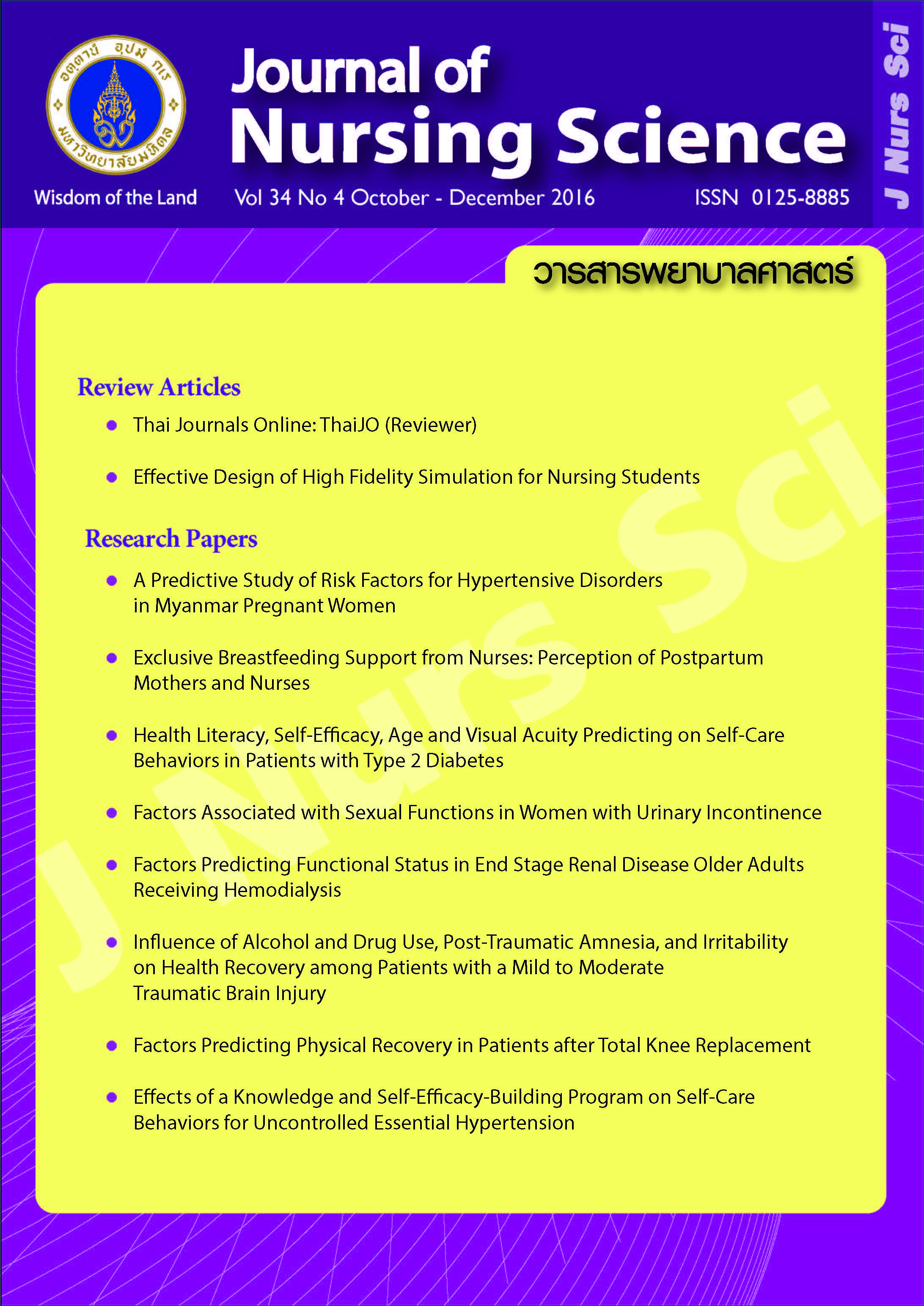Influence of Alcohol and Drug Use, Post-Traumatic Amnesia, and Irritability on Health Recovery among Patients with a Mild to Moderate Traumatic Brain Injury
Main Article Content
Abstract
Abstract
Purpose: The present study aimed at investigating the influence of alcohol and drug use, post-traumatic amnesia, and irritability on health recovery of patients with a mild to moderate traumatic brain injury.
Design: Correlational predictive design.
Methods: The sample consisted of 78 patients with a mild to moderate traumatic brain injury at two tertiary hospitals. Data were collected by means of the demographic characteristics questionnaire, the Thai Mental State Exam, the traumatic brain injury record form, the Alcohol, Smoking, and Substance Involvement Screening Test (ASSIST), the Irritability Scale, and the Health Recovery Questionnaires. Multiple regression analysis was used to analyze the data.
Main findings: The study findings revealed that the subjects, 79.7% drank alcohol, and 59.5% smoked cigarettes. The mean score of post-traumatic amnesia was at a normal level (X = 28.23, SD = 1.73), their mean score of irritability was at a low level (X = 45.24, SD = 18.77), their mean score of overall health recovery was at a good level (X = 123.07, SD = 21.67). However, irritability, alcohol and drug use were accounted for 32.5% of variance in post-traumatic recovery of patients with statistical significance (R2 = .325, F(3, 70) = 11.211, p < .05).
Conclusion and recommendations: Alcohol and drug use, and irritability influent on health recovery. Therefore, nurses should assess the alcohol and drug use, and irritability of the patients for managing problems and promoting early recovery.
อิทธิพลของการใช้สุราและสารเสพติด การหลงลืมภายหลังบาดเจ็บ และความแปรปรวนทางอารมณ์ ต่อการฟื้นตัวของสุขภาพผู้ป่วยบาดเจ็บศีรษะเล็กน้อยถึงปานกลาง
บทคัดย่อ
วัตถุประสงค์: ศึกษาอิทธิพลของการใช้สุราและสารเสพติด การหลงลืมภายหลังบาดเจ็บ และความแปรปรวนทางอารมณ์ ต่อการฟื้นตัวของสุขภาพผู้ป่วยบาดเจ็บศีรษะเล็กน้อยถึงปานกลาง
รูปแบบการวิจัย: การหาความสัมพันธ์เชิงทำนาย
วิธีดำเนินการวิจัย: กลุ่มตัวอย่างเป็นผู้ป่วยบาดเจ็บศีรษะเล็กน้อยถึงปานกลาง 78 ราย ของโรงพยาบาลตติยภูมิ จำนวน 2 แห่ง เก็บข้อมูลด้วยแบบบันทึกข้อมูลส่วนบุคคล แบบทดสอบสภาพสมองของไทย แบบประเมินการใช้สุราและสารเสพติด ความแปรปรวนทางอารมณ์ และการฟื้นตัวของสุขภาพ วิเคราะห์ข้อมูลโดยใช้สถิติถดถอยพหุคูณ
ผลการวิจัย: กลุ่มตัวอย่างดื่มสุรา 79.7% สูบบุหรี่ 59.5% การหลงลืมภายหลังบาดเจ็บอยู่ในเกณฑ์ปกติ (X = 28.23, SD = 1.73) ความแปรปรวนทางอารมณ์อยู่ในระดับต่ำ (X = 45.24, SD = 18.77) การฟื้นตัวของสุขภาพอยู่ในระดับดี (X = 123.07, SD = 21.67) ทั้งนี้ ความแปรปรวนทางอารมณ์ และการใช้สุราและสารเสพติดสามารถอธิบายความแปรปรวนของการฟื้นตัวของสุขภาพได้ร้อยละ 32.5 อย่างนัยสำคัญทางสถิติ (R2 = .325, F(3, 70) = 11.211, p < .05)
สรุปและข้อเสนอแนะ: ความแปรปรวนทางอารมณ์ และการใช้สุราและสารเสพติดมีอิทธิพลต่อการฟื้นตัวจึงเสนอแนะว่าพยาบาลควรประเมินการใช้สุราและสารเสพติด ความแปรปรวนทางอารมณ์ เพื่อบำบัดและส่งเสริมการฟื้นตัวของสุขภาพผู้ป่วยบาดเจ็บศีรษะตั้งแต่ระยะแรก
คำสำคัญ : การใช้สุราและสารเสพติด การฟื้นตัวการหลงลืมภายหลังบาดเจ็บ ความแปรปรวนทางอารมณ์ ผู้ป่วยบาดเจ็บศรีษะ
Article Details
Copyright Notice: Nursing Science Journal of Thailand has exclusive rights to publish and distribute the manuscript and all contents therein. Without the journal’s permission, the dissemination of the manuscript in another journal or online, and the reproduction of the manuscript for non-educational purpose are prohibited.

Disclaimer: The opinion expressed and figures provided in this journal, NSJT, are the sole responsibility of the authors. The editorial board bears no responsibility in this regard.

